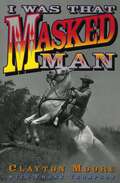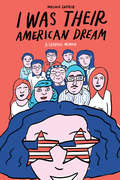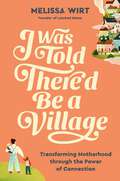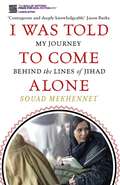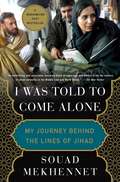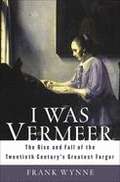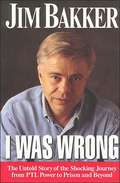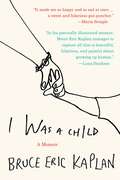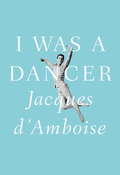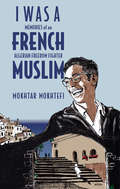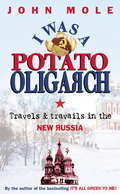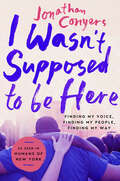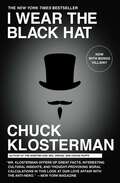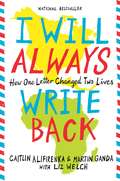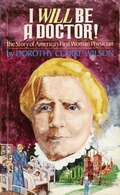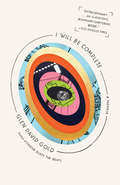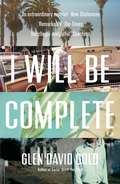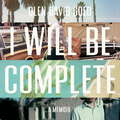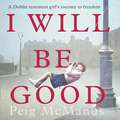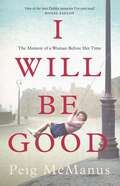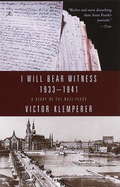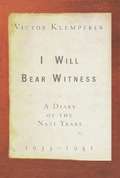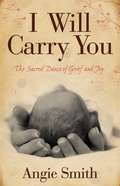- Table View
- List View
I Was That Masked Man
by Clayton MooreEvery baby boomer in America knows who that masked man was. He was mysterious and mythic at the same time, the epitome of the American hero: compassionate, honest, patriotic, inventive, an unswerving champion of justice and fair play.
I Was Their American Dream: A Graphic Memoir
by Malaka GharibI Was Their American Dream is at once a coming-of-age story and a reminder of the thousands of immigrants who come to America in search for a better life for themselves and their children. The daughter of parents with unfulfilled dreams themselves, Malaka navigated her childhood chasing her parents' ideals, learning to code-switch between her family's Filipino and Egyptian customs, adapting to white culture to fit in, crushing on skater boys, and trying to understand the tension between holding onto cultural values and trying to be an all-American kid. <P><P> Malaka Gharib's triumphant graphic memoir brings to life her teenage antics and illuminates earnest questions about identity and culture, while providing thoughtful insight into the lives of modern immigrants and the generation of millennial children they raised. Malaka's story is a heartfelt tribute to the American immigrants who have invested their future in the promise of the American dream. <P><P><i>Advisory: Bookshare has learned that this book offers only partial accessibility. We have kept it in the collection because it is useful for some of our members. Benetech is actively working on projects to improve accessibility issues such as these.</i>
I Was There: Dispatches from a Life in Rock and Roll
by Alan Edwards'Alan is such a wonderful storyteller' Debbie Harry 'Alan Edwards is a class act: observant, attentive, always in the right place at the right time. I Was There tells you how' Jon Savage 'A beautiful, warm, jaw-dropping, once-in-a-lifetime, lifting-the-stone guide to a secret world . . . I loved it' Tony Parsons 'Revelatory' Will Hodgkinson, The Times 'A master of page-turning readability . . . an insider's view of operating inside the world of David Bowie, Michael Jackson, Amy Winehouse, Paul McCartney and a gaggle of A+ listers' MojoAlan Edwards, the godfather of British music PR, has worked with some of the most legendary artists of our time, from David Bowie to the Spice Girls via the Rolling Stones, the Stranglers, Prince and Amy Winehouse. In I Was There, he describes getting his break in the mid-'70s as a scruffy, stoned 20-year-old just back from the hippie trail; his encounter with London's thriving punk scene, which inspired him to set up his own PR company; broadening his horizons as his work with the likes of Blondie takes him to the US and beyond; and his move into the world of pop with the Spice Girls during the tabloid-crazed '90s. At the centre of this story sits the defining relationship of Edwards' career: his close, thirty-year collaboration with David Bowie. He guides us through a series of vivid, funny, always insightful behind-the-scenes reports, whether he's playing a spontaneous game of football with Bob Marley, listening to Prince discuss the future of civilisation in a nightclub VIP area, or being used as a pawn in the power struggle between Mick Jagger and Keith Richards. Above all, we're treated to Edwards' fascinating observations about the brilliant artists he has worked with and what makes them tick, as he looks back on his role in the last five decades of music and culture.
I Was Told There'd Be a Village: Transforming Motherhood through the Power of Connection
by Melissa WirtMelissa Wirt recounts her journey and dozens of others in building a supportive &“village&” to transform oppressive, solitary motherhood into a connected—even joyful—endeavor. Melissa Wirt thought she had everything—she'd built her own company and moved to a beautiful farm with her family. Then during a personal crisis, she realized that despite having created an online community reaching thousands of moms, she&’d also somehow, become utterly isolated. In I Was Told There'd Be a Village, Melissa leads us through the small changes she made to seek out connection. She also recounts how she talked to mothers from across the country, and soon saw that the beliefs keeping each of us parenting solo – I don&’t have time; my life is too messy – were also keeping us from accessing our most powerful resource: each other. The stories she uncovered, combined with her own, became a foundation for slowly building back community. That journey starts with an intentional shift from an isolation mindset to a village mindset. It might be as simple as smiling at the mom next to you at story-time or sending a quick text to a friend. But it can be much bigger, eventually growing into a thriving, supportive community. Motherhood shouldn&’t be this hard, and it doesn&’t have to be. Here, at last, is a roadmap for finding your village.
I Was Told To Come Alone: My Journey Behind the Lines of Jihad
by Souad MekhennetI was told to come alone. I was not to carry any identification, and would have to leave my cell phone, audio recorder, watch, and purse at my hotel . . .For her whole life, Souad Mekhennet, a reporter for the Washington Post who was born and educated in Germany, has had to balance the two sides of her upbringing - Muslim and Western. She has also sought to provide a mediating voice between these cultures, which too often misunderstand each other.In this compelling and evocative memoir, we accompany Mekhennet as she journeys behind the lines of jihad, starting in the German neighbourhoods where the 9/11 plotters were radicalised and the Iraqi neighbourhoods where Sunnis and Shia turned against one another, and culminating on the Turkish/Syrian border region where ISIS is a daily presence. In her travels across the Middle East and North Africa, she documents her chilling run-ins with various intelligence services and shows why the Arab Spring never lived up to its promise. She then returns to Europe, first in London, where she uncovers the identity of the notorious ISIS executioner 'Jihadi John', and then in France, Belgium and her native Germany, where terror has come to the heart of Western civilisation.Mekhennet's background has given her unique access to some of the world's most wanted men, who generally refuse to speak to Western journalists. She is not afraid to face personal danger to reach out to individuals in the inner circles of Al Qaeda, the Taliban, ISIS and their affiliates; when she is told to come alone to an interview, she never knows what awaits at her destination.Souad Mekhennet is an ideal guide to introduce us to the human beings behind the ominous headlines, as she shares her transformative journey with us. Hers is a story you will not soon forget.
I Was Told to Come Alone: My Journey Behind The Lines Of Jihad
by Souad Mekhennet“I was told to come alone. I was not to carry any identification, and would have to leave my cell phone, audio recorder, watch, and purse at my hotel. . . .”For her whole life, Souad Mekhennet, a reporter for The Washington Post who was born and educated in Germany, has had to balance the two sides of her upbringing – Muslim and Western. She has also sought to provide a mediating voice between these cultures, which too often misunderstand each other.In this compelling and evocative memoir, we accompany Mekhennet as she journeys behind the lines of jihad, starting in the German neighborhoods where the 9/11 plotters were radicalized and the Iraqi neighborhoods where Sunnis and Shia turned against one another, and culminating on the Turkish/Syrian border region where ISIS is a daily presence. In her travels across the Middle East and North Africa, she documents her chilling run-ins with various intelligence services and shows why the Arab Spring never lived up to its promise. She then returns to Europe, first in London, where she uncovers the identity of the notorious ISIS executioner “Jihadi John,” and then in France, Belgium, and her native Germany, where terror has come to the heart of Western civilization.Mekhennet’s background has given her unique access to some of the world’s most wanted men, who generally refuse to speak to Western journalists. She is not afraid to face personal danger to reach out to individuals in the inner circles of Al Qaeda, the Taliban, ISIS, and their affiliates; when she is told to come alone to an interview, she never knows what awaits at her destination.Souad Mekhennet is an ideal guide to introduce us to the human beings behind the ominous headlines, as she shares her transformative journey with us. Hers is a story you will not soon forget.
I Was Vermeer: The Rise and Fall of the Twentieth Century's Greatest Forger
by Frank WynneIn 1945, a small-time Dutch art dealer was arrested for selling a priceless national treasure--a painting by Vermeer--to the Nazi commander Hermann Göring. The charge was treason; the only possible sentence, death. And yet Han van Meegeren languished in his dank prison cell, incapable of uttering the four simple words that would set him free: "I am a forger." I Was Vermeer is the outrageous true story of one of the greatest art forgers of all time. From his early childhood, Han had dreamed of being an artist, but in the electrifying world of modern art, critics ridiculed his art as hopelessly old-fashioned. Furious and embittered, he turned to forgery--and became a secret superstar of the art world. In his heyday as a forger, he earned the equivalent of fifty million dollars and the acclaim of the world's press, and saw his paintings hung alongside those of Rembrandt and Vermeer. The acceptance of his work was so complete that when he finally confessed, no one believed him--until, in a huge media event, the courts staged the public painting of what would be van Meegeren's last "Vermeer." Frank Wynne's gripping book exposes the life and techniques of the consummate forger, the fascinating work of the experts who try to track down the fakes, and the collusion and ego in the art establishment that, even today, allow forgery to thrive. Wry, surprising, and with the drive of a thriller, it is the first major book in forty years on this extraordinary episode in history. A real page-turner! FRANK WYNNE is a journalist and literary translator. He was awarded the 2002 IMPAC Prize for his translation of Michel Houellebecq's The Elementary Particles, and the 2005 Independent Foreign Fiction Prize for his translation of Frédéric Beigbeder's Windows on the World. He has also translated the work of Pierre Mérot, Philippe Besson, and Ahmadou Kourouma. He has written for the Sunday Times, the Independent, the Irish Times, Melody Maker, and Time Out. Born in Ireland, he is currently based in London.
I Was Wrong
by Jim BakkerAn air-conditioned doghouse. Tammy Faye crying on camera. Jessica Hahn. Jerry Falwell. The media circus gleefully trumpeted every detail of Jim and Tammy Faye's dizzying descent from the pinnacle of the multimillion-dollar Heritage USA Retreat Center and The Inspirational Network to ignominy, impoverishment--and in Jim's case - imprisonment. Yet the loss of his empire, his money, his home, and his reputation in the two years leading up to his imprisonment in 1989 was only the beginning. In prison, he was to lose even more-his freedom, his sanity, his dignity, his confidence in his faith, and eventually even his wife. Inmate 07407-058, one-time confidant to presidents, had hit bottom. In the humiliation, loneliness, and abject despair of prison, Bakker gradually began to realize that he had to dig deep and face things about himself that as a free man he had been too busy to face. What were those issues? How did he face them? How was he changed? Now for the very first time, Jim Bakker tells his own story--the glory days as a televangelist, the hostile takeover, the emotional breakdown. How he got to prison, his experiences behind bars, and what he learned. Jim Bakker was wrong about many things. Exactly what they were and how he came to confess them will surprise you and inspire you. This is his story.
I Was a Child
by Bruce Eric KaplanI Was a Child is an illustrated memoir by Bruce Eric Kaplan, the renowned New Yorker cartoonist. Bruce Eric Kaplan, also known as BEK, is one of the most celebrated and admired cartoonists in America.<P><P> I Was a Child is the story of his childhood in suburban New Jersey, detailing the small moments we all experience: going to school, playing with friends, family dinners, watching TV on a hot summer night, and so on. It would seem like a conventional childhood, although Kaplan's anecdotes are accompanied by his signature drawings of family outings and life at home-road trips, milk crates, hamsters, ashtrays, a toupee, a platypus, and much more. Kaplan's cartoons, although simple, are never straightforward; they encompass an easy irony and dark humor that often cuts straight to the truth of experience. <P>Brilliantly relatable and genuinely moving, I Was a Child is about our attempts to understand the mysteries that are our parents, our families, and ourselves.From the Hardcover edition.
I Was a Dancer
by Jacques D'Amboise"Who am I? I'm a man; an American, a father, a teacher, but most of all, I am a person who knows how the arts can change lives, because they transformed mine. I was a dancer." In this rich, expansive, spirited memoir, Jacques d'Amboise, one of America's most celebrated classical dancers, and former principal dancer with the New York City Ballet for more than three decades, tells the extraordinary story of his life in dance, and of America's most renowned and admired dance companies. He writes of his classical studies beginning at the age of eight at The School of American Ballet. At twelve he was asked to perform with Ballet Society; three years later he joined the New York City Ballet and made his European debut at London's Covent Garden. As George Balanchine's protégé, d'Amboise had more works choreographed on him by "the supreme Ballet Master" than any other dancer, among them Tchaikovsky Pas de Deux; Episodes; A Midsummer's Night's Dream; Jewels; Raymonda Variations.He writes of his boyhood--born Joseph Ahearn--in Dedham, Massachusetts; his mother ("the Boss") moving the family to New York City's Washington Heights; dragging her son and daughter to ballet class (paying the teacher $7.50 from hats she made and sold on street corners, and with chickens she cooked stuffed with chestnuts); his mother changing the family name from Ahearn to her maiden name, d'Amboise ("It's aristocratic. It has the 'd' apostrophe. It sounds better for the ballet, and it's a better name"). We see him. a neighborhood tough, in Catholic schools being taught by the nuns; on the streets, fighting with neighborhood gangs, and taking ten classes a week at the School of American Ballet . . . being taught professional class by Balanchine and by other teachers of great legend: Anatole Oboukhoff, premier danseur of the Maryinsky; and Pierre Vladimiroff, Pavlova's partner. D'Amboise writes about Balanchine's succession of ballerina muses who inspired him to near-obsessive passion and led him to create extraordinary ballets, dancers with whom d'Amboise partnered--Maria Tallchief; Tanaquil LeClercq, a stick-skinny teenager who blossomed into an exquisite, witty, sophisticated "angel" with her "long limbs and dramatic, mysterious elegance . . ."; the iridescent Allegra Kent; Melissa Hayden; Suzanne Farrell, who Balanchine called his "alabaster princess," her every fiber, every movement imbued with passion and energy; Kay Mazzo; Kyra Nichols ("She's perfect," Balanchine said. "Uncomplicated--like fresh water"); and Karin von Aroldingen, to whom Balanchine left most of his ballets. D'Amboise writes about dancing with and courting one of the company's members, who became his wife for fifty-three years, and the four children they had . . . On going to Hollywood to make Seven Brides for Seven Brothers and being offered a long-term contract at MGM ("If you're not careful," Balanchine warned, "you will have sold your soul for seven years") . . . On Jerome Robbins ("Jerry could be charming and complimentary, and then, five minutes later, attack, and crush your spirit--all to see how it would influence the dance movements"). D'Amboise writes of the moment when he realizes his dancing career is over and he begins a new life and new dream teaching children all over the world about the arts through the magic of dance. A riveting, magical book, as transformative as dancing itself.
I Was a French Muslim: Memories of an Algerian Freedom Fighter
by Mokhtar MokhtefiThis engaging memoir provides a vivid account of a childhood under French colonization and a life dedicated to fighting for the freedom and dignity of the Algerian people.The son of a butcher and the youngest of six siblings, Mokhtar Mokhtefi was born in 1935 and grew up in a village de colonisation roughly one hundred kilometers south of the capital of Algiers. Thanks to the efforts of a supportive teacher, he became the only child in the family to progress to high school, attending a French lycée that deepened his belief in the need for independence. In 1957, at age twenty-two, he joined the National Liberation Army (ALN), the armed wing of the National Liberation Front (FLN), which had been waging war against France since 1954. After completing rigorous training in radio transmissions at a military base in Morocco, he went on to become an officer in the infamous Ministère de l&’Armement et des Liaisons Générales (MALG), the precursor of post-independence Algeria&’s Military Security (SM). Mokhtefi&’s powerful memoir bears witness to the extraordinary men and women who fought for Algerian independence against a colonial regime that viewed non-Europeans as fundamentally inferior, designating them not as French citizens, but as &“French Muslims.&” He presents a nuanced, intelligent, and deeply personal perspective on Algeria&’s transition to independent statehood, with all its inherent opportunities and pitfalls.
I Was a Potato Oligarch
by John MoleIn this eye-wateringly funny account from John Mole, readers will experience "the real Russia" firsthand. Beginning with a risky business venture inspired by British fast food, Mole attempts to submerge himself in Russian culture-but often finds himself in the middle of a fiasco instead.
I Wasn't Supposed to Be Here: Finding My Voice, Finding My People, Finding My Way
by Jonathan ConyersAs seen on Humans of New York, Jonathan Conyers introduces us to the teachers, his debate coach, a homeless man, and a boy named Diego who changed his life. Booklist calls it &“a moving story about finding your supporters and building your future.&” Everybody was rooting for Jonathan Conyers after seeing his profile on Humans of New York went viral and sparked millions in donations to the Brooklyn Debate League. The kid who went from struggling to read to being a breakout star on his high school debate team, thanks to a life-changing friendship with his transgender debate coach, captured the heart of America. Jonathan&’s story highlights the important role teachers play in opening up worlds of opportunity for the most vulnerable students. In I Wasn&’t Supposed to Be Here, Jonathan shares the full story of his incredible journey escaping the precarious circumstances he was born into, and the teachers, mentors, and guides who helped him along the way. Born into a family crippled by addiction and homelessness, Jonathan &“failed&” kindergarten and was told he would never succeed academically. But instead, Jonathan found ways to defy the limited expectations placed upon him by building a village to save his own life, and realize his dream to get into medical school. Throughout this heartwarming memoir, we meet the unique and diverse cast of characters who made up Jonathan&’s village and helped him change the trajectory of his life.
I Wear the Black Hat: Grappling with Villains (Real and Imagined)
by Chuck KlostermanOne-of-a-kind cultural critic and New York Times bestselling author Chuck Klosterman “offers up great facts, interesting cultural insights, and thought-provoking moral calculations in this look at our love affair with the anti-hero” (New York magazine).Chuck Klosterman, “The Ethicist” for The New York Times Magazine, has walked into the darkness. In I Wear the Black Hat, he questions the modern understanding of villainy. When we classify someone as a bad person, what are we really saying, and why are we so obsessed with saying it? How does the culture of malevolence operate? What was so Machiavellian about Machiavelli? Why don’t we see Bernhard Goetz the same way we see Batman? Who is more worthy of our vitriol—Bill Clinton or Don Henley? What was O.J. Simpson’s second-worst decision? And why is Klosterman still haunted by some kid he knew for one week in 1985? Masterfully blending cultural analysis with self-interrogation and imaginative hypotheticals, I Wear the Black Hat delivers perceptive observations on the complexity of the antihero (seemingly the only kind of hero America still creates). As the Los Angeles Times notes: “By underscoring the contradictory, often knee-jerk ways we encounter the heroes and villains of our culture, Klosterman illustrates the passionate but incomplete computations that have come to define American culture—and maybe even American morality.” I Wear the Black Hat is a rare example of serious criticism that’s instantly accessible and really, really funny.
I Will Always Write Back: How One Letter Changed Two Lives
by Liz Welch Martin Ganda Caitlin AlifirenkaThe true story of an all-American girl and a boy from Zimbabwe and the letter that changed both of their lives forever. <P><P>It started as an assignment. Everyone in Caitlin's class wrote to an unknown student somewhere in a distant place. Martin was lucky to even receive a pen-pal letter. There were only ten letters, and forty kids in his class. But he was the top student, so he got the first one. <P><P>That letter was the beginning of a correspondence that spanned six years and changed two lives. <P><P>In this compelling dual memoir, Caitlin and Martin recount how they became best friends --and better people--through their long-distance exchange. Their story will inspire you to look beyond your own life and wonder about the world at large and your place in it.
I Will Be A Doctor!
by Dorothy C. Wilson"I Will Be A Doctor" is a biography of Elizabeth Blackwell, the first woman physician in The United States. While the story may be classified as juvenile literature, I found it a pleasure to read and very enjoyable. The biography traces Elizabneth Blackwell's life from her childhood in England, to her migration to The United States, and much later back to England. Her life as a pioneer in her chosen vocation is fastinating. Because she lived primarily in the 19th century, there are many social issues which are discussed--slavery, women's rights, extreme poverty, infant death, and the huge issue of hygeine. Enjhoy!
I Will Be Complete: A Memoir
by Glen David GoldFrom the best-selling author of Carter Beats the Devil and Sunnyside, a big-hearted memoir told in three parts: about growing up in the wake of the destructive choices of an extremely unconventional mother.Glen David Gold was raised rich, briefly, in southern California at the end of the go-go 1960s. But his father's fortune disappears, his parents divorce, and Glen falls out of his well-curated life and into San Francisco at the epicenter of the Me Decade: the inimitable '70s. Gold grows up with his mother, among con men and get-rich schemes. Then, one afternoon when he's twelve, she moves to New York without telling him, leaving him to fend for himself. I Will Be Complete is the story of how Gold copes, honing a keen wit and learning how to fill in the emotional gaps: "I feel love and then it's like I'm driving on black ice with no contact against the road." He leads us though his early salvation at boarding school; his dream job at an independent bookstore in Los Angeles in 1983; a punk rock riot; a romance with a femme fatale to the soundtrack of R.E.M.; and his attempts to forge a career as a writer. Along the way, Gold becomes increasingly fascinated with his father's self-described "cheerful amorality" and estranged from his mother, who lives with her soulmate, a man who threatens to kill her. Clear-eyed and heartbreaking, Gold's story ultimately speaks to everyone who has struggled with the complexity of parental bonds by searching for--and finding--autonomy.
I Will Be Complete: A Memoir
by Glen David Gold'I Will Be Complete is the best memoir I've read in years. It's likely the best memoir published in years.' Darin Strauss, author of Half a Life and Chang and EngFrom the bestselling author of Carter Beats the Devil and Sunnyside, a shocking, big-hearted memoir about his bizarre upbringing in California in the 1970s and how he survived it. Glen David Gold grew up rich on the beaches of 1970s California, until his father lost a fortune and his parents divorced when he was ten.Glen and his English mother moved to San Francisco, where she was fleeced by a series of charming con men and turned increasingly wayward. When he was twelve, she took off for New York without telling him, leaving him to fend for himself. On midnight streets and at drug-fuelled parties, wise-cracking his way through an alarming adult world, Glen watched his mother's countless, wild attempts to reinvent herself. In this exceptional memoir, acclaimed novelist Glen David Gold captures his bizarre, lonely upbringing and how it shaped him as an adult with stunning insight and unsparing candour. Shocking, mordantly funny and achingly affecting, he tells an unforgettable story of the years he spent trying to rescue his mother - and his ultimate realisation that only by breaking free could he ever hope to be complete.'The prose is crystalline, hard as real diamonds, flashing, revealing. The story is simple, just a boy and his mother's long disintegration, but the journey is darkly complicated, heartbreaking, beautiful as hell.' Mark Childress, author of Crazy in Alabama
I Will Be Complete: A Memoir
by Glen David Gold'I Will Be Complete is the best memoir I've read in years. It's likely the best memoir published in years.' Darin Strauss, author of Half a Life and Chang and EngFrom the bestselling author of Carter Beats the Devil and Sunnyside, a shocking, big-hearted memoir about his bizarre upbringing in California in the 1970s and how he survived it. Glen David Gold grew up rich on the beaches of 1970s California, until his father lost a fortune and his parents divorced when he was ten.Glen and his English mother moved to San Francisco, where she was fleeced by a series of charming con men and turned increasingly wayward. When he was twelve, she took off for New York without telling him, leaving him to fend for himself. On midnight streets and at drug-fuelled parties, wise-cracking his way through an alarming adult world, Glen watched his mother's countless, wild attempts to reinvent herself. In this exceptional memoir, acclaimed novelist Glen David Gold captures his bizarre, lonely upbringing and how it shaped him as an adult with stunning insight and unsparing candour. Shocking, mordantly funny and achingly affecting, he tells an unforgettable story of the years he spent trying to rescue his mother - and his ultimate realisation that only by breaking free could he ever hope to be complete.'The prose is crystalline, hard as real diamonds, flashing, revealing. The story is simple, just a boy and his mother's long disintegration, but the journey is darkly complicated, heartbreaking, beautiful as hell.' Mark Childress, author of Crazy in Alabama(P)2018 Penguin Random House Audio
I Will Be Good: A Dublin tenement girl's journey to freedom
by Peig McManus'One of the best Dublin memoirs I've ever read' Donal FallonPeig McManus was born into the last of Dublin's tenements before moving to one of Ireland's first social housing estates in Cabra. Her father believed that children should earn their keep and learn to face reality as soon as possible. While that reality was poverty, class prejudice and strict Catholicism, at the heart of Peig's earliest memories are music, hoolies and the bonds of family and community.I Will Be Good is the story of a girl who rebelled against societal expectations and dreamed of further education. It tells of a young woman whose hopes of marriage to a Scottish sailor ended in the heartbreak of a daughter given up for adoption; of a mother who needed something more than her 'place at home'; and of a pioneering citizen who became one of Ireland's foremost campaigners for educational reform.Now, in her eighties, Peig shares her story of grit and courage: an inspiring journey through the trials and triumphs of a remarkable Irish woman who refused to do what she was told.
I Will Be Good: A Memoir of a Dublin Childhood and a Life Less Ordinary
by Peig McManus'One of the best Dublin memoirs I've ever read' Donal FallonPeig McManus was born into the last of Dublin's tenements before moving to one of Ireland's first social housing estates in Cabra. Her father believed that children should earn their keep and learn to face reality as soon as possible. While that reality was poverty, class prejudice and strict Catholicism, at the heart of Peig's earliest memories are music, hoolies and the bonds of family and community.I Will Be Good is the story of a girl who rebelled against societal expectations and dreamed of further education. It tells of a young woman whose hopes of marriage to a Scottish sailor ended in the heartbreak of a daughter given up for adoption; of a mother who needed something more than her 'place at home'; and of a pioneering citizen who became one of Ireland's foremost campaigners for educational reform.Now, in her eighties, Peig shares her story of grit and courage: an inspiring journey through the trials and triumphs of a remarkable Irish woman who refused to do what she was told.
I Will Be Good: A Memoir of a Dublin Childhood and a Life Less Ordinary
by Peig McManus'One of the best Dublin memoirs I've ever read' Donal FallonPeig McManus was born into the last of Dublin's tenements before moving to one of Ireland's first social housing estates in Cabra. Her father believed that children should earn their keep and learn to face reality as soon as possible. While that reality was poverty, class prejudice and strict Catholicism, at the heart of Peig's earliest memories are music, hoolies and the bonds of family and community.I Will Be Good is the story of a girl who rebelled against societal expectations and dreamed of further education. It tells of a young woman whose hopes of marriage to a Scottish sailor ended in the heartbreak of a daughter given up for adoption; of a mother who needed something more than her 'place at home'; and of a pioneering citizen who became one of Ireland's foremost campaigners for educational reform.Now, in her eighties, Peig shares her story of grit and courage: an inspiring journey through the trials and triumphs of a remarkable Irish woman who refused to do what she was told.
I Will Bear Witness, Volume 1: 1933-1941
by Victor KlempererThe publication of Victor Klemperer's secret diaries brings to light one of the most extraordinary documents of the Nazi period. "In its cool, lucid style and power of observation," said The New York Times, "it is the best written, most evocative, most observant record of daily life in the Third Reich." I Will Bear Witness is a work of literature as well as a revelation of the day-by-day horror of the Nazi years.
I Will Bear Witness: A Diary of the Nazi Years, 1933-1941
by Martin Chalmers Victor KlempererI Will Bear Witness is a work of literature as well as a revelation of the day-by-day horror of the Nazi years. Victor Klemperer's secret diaries brings to light one of the most extraordinary documents of the Nazi period.
I Will Carry You: The Sacred Dance of Grief and Joy
by Angie SmithIn 2008, Angie Smith and her husband Todd (lead singer of the group Selah) learned through ultrasound that their fourth daughter had conditions making her "incompatible with life." Advised to terminate the pregnancy, the Smiths chose instead to carry this child and allow room for a miracle. That miracle came the day they met Audrey Caroline and got the chance to love her for the precious two-and-a-half hours she lived on earth. Upon receiving the original diagnosis, Angie started a blog (Bring the Rain) to keep family and friends informed of their journey. Soon, the site exploded in popularity, connecting with thousands who were either experiencing their own heartbreaking situations or simply curious about how God could carry someone through something so tragic. I Will Carry You tells the powerful story of a parent losing her child, interwoven with the biblical story of Lazarus to help those who mourn to still have hope--to find grace and peace in the sacred dance of grief and joy.
